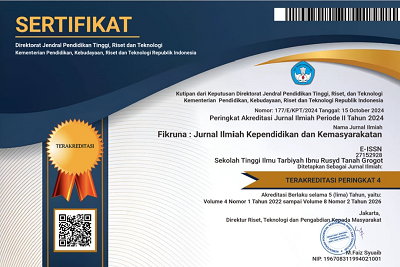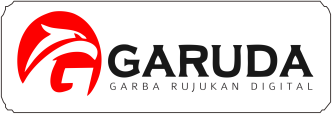THE PRINCIPLES OF QARD HASAN IN DEBTS AND RECEIVABLES: (OF STRENGTHENING THE UMMAH ECONOMY AND SHARIA FINTECH REGULATION)
Abstract
The principles of Qard Hasan and Ihsan in Islamic debt practices have great potential in strengthening the people's economy through an Islamic financial approach that is equitable and based on spiritual values. However, the integration of these principles in the regulation and practice of Islamic fintech in Indonesia still faces challenges, both in terms of policy, public awareness, and the sustainability of the business model. This study aims to analyze the role and implementation of the principles of Qard Hasan and Ihsan as reflected in QS. Al-Baqarah: 280-281, and evaluate its contribution to strengthening the digital Islamic financial system in Indonesia. The method used is Systematic Literature Review (SLR) with PRISMA approach through five scientific databases: Crossref, ScienceDirect, Semantic Scholar, SINTA, and Google Scholar. The results showed that Qard Hasan has a strategic role in encouraging financial inclusion and empowering MSMEs without usury. While the value of Ihsan strengthens the dimensions of ethics and social justice in economic interactions. In the context of Islamic fintech, the integration of Qard Hasan still requires the support of clear regulations, adaptive technology, and massive public education. This research recommends the development of Qard Hasan-based Islamic Fintech model as an ethical and inclusive financing solution based on maqashid sharia.
References
Abdelgafar, B. I. (2018). Public policy: Beyond traditional jurisprudence: A Maqasid approach. International Institute of Islamic Thought (IIIT).
Abdullah, M. (2018). Waqf, sustainable development goals (SDGs) and maqasid al-shariah. International Journal of Social Economics, 45(1), 158-172.
Aderemi, A. M. R., & Ishak, M. S. I. (2020). Crowdfunding as an alternative mode of financing for micro and small enterprises: a proposed qard-al-Hasan contract. International Journal of Islamic Economics and Finance (IJIEF), 3, 95-118.
Aderemi, A. M. R., & Ishak, M. S. I. (2023). Qard Hasan as a feasible Islamic financial instrument for crowdfunding: its potential and possible application for financing micro-enterprises in Malaysia. Qualitative Research in Financial Markets, 15(1), 58-76.
Adiyono, Adiyono, et al. "13 ChatGPT and Active Learning." Empowering Digital Education with ChatGPT: From Theoretical to Practical Applications (2024): 189.
Afdhal, Afdhal, et al. Sistem Ekonomi Islam. Yayasan Tri Edukasi Ilmiah, 2024.
An understanding of QS. Al-Baqarah: 280-281 holistically shows that Islam does not only regulate the transactional aspects of debt and credit.
Anwar, H. M., Erniyati, S. H., Mubaraq, A., SE, S., Aripin, H. Z., Nuruddin Subhan, S. E., ... & Citra Dewi, S. E. (2023). Manajemen Perbankan Syariah. Cendikia Mulia Mandiri.
Aravik, H., Amri, H., & Febrianti, R. (2022). The marketing ethics of Islamic banks: a theoretical study. Islamic Banking: Jurnal Pemikiran Dan Pengembangan Perbankan Syariah, 7(2), 263-282.
Archer, S., Karim, R. A. A., & Nienhaus, V. (Eds.). (2011). Takaful Islamic insurance: Concepts and regulatory issues. John Wiley & Sons.
Arwani, A., & Priyadi, U. (2024). Eksplorasi peran teknologi blockchain dalam meningkatkan transparansi dan akuntabilitas dalam keuangan Islam: Tinjauan sistematis. Jurnal Ekonomi Bisnis Dan Manajemen, 2(2), 23-37.
Arwani, A., Oktaviani, N., & DwiKurniadi, S. (2024). Membangun Ekonomi Berbasis Akhlaq dan Syariah: Tantangan dan Peluang. Tasyri': Jurnal Muamalah dan Ekonomi Syariah, 6(2), 58-80.
Bahsoan, A. (2011). Mashlahah sebagai maqashid al syariah (tinjauan dalam perspektif ekonomi Islam). Jurnal Inovasi, 8(01).
Bensaid, B., Grine, F., Nor, M. R. M., & Yusoff, M. Y. Z. M. (2013). Enduring financial debt: an Islamic perspective. Middle-East Journal of Scientific Research, 13(2), 162-170.
Bin Hasan, Z. (2016). From legalism to value-oriented Islamic finance practices. Humanomics, 32(4), 437-458.
Bornbaum, C. C., Kornas, K., Peirson, L., & Rosella, L. C. (2015). Exploring the function and effectiveness of knowledge brokers as facilitators of knowledge translation in health-related settings: a systematic review and thematic analysis. Implementation science, 10, 1-12.
Budiman, Ali Mumin, Mubarok Fatahillah, and Abd Rasyid M. Akib. "STRATEGIC MANAGEMENT PRACTICES IN PESANTREN: INNOVATIONS FOR ENHANCING EDUCATIONAL QUALITY AND ORGANIZATIONAL SUSTAINABILITY." MOJEM: Malaysian Online Journal of Educational Management 13.2 (2025): 86-97.
Chang, S. E., Chen, Y. C., & Lu, M. F. (2019). Supply chain re-engineering using blockchain technology: A case of smart contract based tracking process. Technological forecasting and social change, 144, 1-11.
Chawla, N., & Kumar, B. (2022). E-commerce and consumer protection in India: the emerging trend. Journal of Business Ethics, 180(2), 581-604.
Chen, C. (2017). Science mapping: a systematic review of the literature. Journal of data and information science, 2(2).
Cruzes, D. S., Dyb�, T., Runeson, P., & H�st, M. (2015). Case studies synthesis: a thematic, cross-case, and narrative synthesis worked example. Empirical Software Engineering, 20, 1634-1665.
Daluwathumullagamage, D. J., & Sims, A. (2021). Fantastic beasts: Blockchain based banking. Journal of risk and financial management, 14(4), 1-43.
Djakfar, H. M., & SH, M. A. (2012). Etika bisnis: menangkap spirit ajaran langit dan pesan moral ajaran bumi. Penebar PLUS+.
Dsouli, O., Khan, N., & Kakabadse, N. K. (2012). Spiritual capital: The co?evolution of an ethical framework based on Abrahamic religious values in the Islamic tradition. Journal of Management Development, 31(10), 1058-1076.
Dusuki, A. W., & Abdullah, N. I. (2007). Maqasid al-Shariah, Maslahah, and corporate social responsibility. American Journal of Islamic Social Sciences, 24(1), 25.
Eid, W. K., & Asutay, M. (2019). Mapping the risks and risk management practices in Islamic banking. John Wiley & Sons.
Elfakhani, S., & Ahmed, Z. U. (2013). Philosophical basis of entrepreneurship principles within an Islamic ethical framework. Journal of Transnational Management, 18(1), 52-78.
Farooq, M. O., & El-Ghattis, N. (2015). Qard Hasan, Credit Cards and Islamic Financial Product Structuring: Some Qur'anic and Practical Considerations. Journal of Islamic Financial Studies, 1(1), 1-21.
Faruq, U. (2021). Manajemen Keuangan Syariah.
Fattah, H., Riodini, I., Hasibuan, S. W., Rahmanto, D. N. A., Layli, M., Holle, M. H., ... & Marzuki, S. N. (2022). Fintech dalam Keuangan Islam: Teori dan Praktik. Publica Indonesia Utama.
Francis, J. (1851). Chronicles and characters of the Stock Exchange. Longman, Brown, Green, & Longmans.
Handayani, P. W. (2017). Systematic Review dengan PRISMA (Preferred Reporting Items for Systematic Reviews and Meta-analyses). In Workshop Riset Sistem Informasi Fakultas Ilmu Komputer UI (Vol. 9, pp. 1-3).
Harmain, H., Anggriyani, A., Rasidah, R., Nurlaila, N., Olivia, H., Farina, D., ... & Syafina, L. (2019). Akuntansi Syariah Di Indonesia.
Hassan, M. K., Muneeza, A., & Hasan, R. (2025). Islamic finance and sustainable development. Cambridge University Press.
Hassan, M. K., Muneeza, A., & Sarea, A. M. (2022). The impact of the COVID-19 pandemic on Islamic finance: the lessons learned and the way forward. In Towards a post-Covid global financial system (pp. 15-36). Emerald Publishing Limited.
Hemmet, A. (2023). Harmonizing Artificial Intelligence with Islamic Values-A Thoughtful Analysis of Religious, Social, and Economic Impacts of Technological Advancements. American Journal of Smart Technology and Solutions, 2(2), 65-76.
Hudaifah, A., Tutuko, B., Ishaq, A. A., & Albar, M. (2020). Sinergi pengelolaan zakat di Indonesia. Scopindo media pustaka.
Hussein Kakembo, S., Abduh, M., & Pg Hj Md Salleh, P. M. H. A. (2021). Adopting Islamic microfinance as a mechanism of financing small and medium enterprises in Uganda. Journal of Small Business and Enterprise Development, 28(4), 537-552.
Irfan, M., Kadry, S., Sharif, M., & Khan, H. U. (Eds.). (2023). Fintech Applications in Islamic Finance: AI, Machine Learning, and Blockchain Techniques: AI, Machine Learning, and Blockchain Techniques. IGI Global.
Irwan, M. (2021). Kebutuhan Dan Pengelolaan Harta Dalam Maqashid Syariah. Elastisitas: Jurnal Ekonomi Pembangunan, 3(2), 160-174.
Iskandar, A., Possumah, B. T., & Aqbar, K. (2020). Peran ekonomi dan keuangan sosial Islam saat pandemi Covid-19. SALAM: Jurnal Sosial Dan Budaya Syar-I, 7(7), 625-638.
Iswanaji, C., Khotijah, S. A., & Nafi�Hasbi, M. Z. (2021). Lembaga Keuangan Syariah Buku Ajar Konsentrasi Syariah. Penerbit Adab.
Jalil, A., & EI, M. (2013). Spiritual enterpreneurship: Transformasi spiritualitas kewirausahaan. LKIS Pelangi Aksara.
Khadaffi, M., Siregar, S., Noch, M. Y., Nurlaila, N., Harmain, H., & Sumartono, S. (2017). Akuntansi syariah.
Khakim, M. L. (2019). Tinjauan maqashid syari�ah terhadap ayat wal? taqrab? zin? (Doctoral dissertation, IAIN Metro).
Khan, M. M. (2019). Islam and good governance: A political philosophy of ihsan. Springer.
Khan, S. N., Loukil, F., Ghedira-Guegan, C., Benkhelifa, E., & Bani-Hani, A. (2021). Blockchain smart contracts: Applications, challenges, and future trends. Peer-to-peer Networking and Applications, 14, 2901-2925.
Khatib, S. (2018). Konsep Maqashid Al-Syariah: Perbandingan Antara Pemikiran Al-Ghazali Dan Al-Syathibi. Jurnal Ilmiah Mizani: Wacana Hukum, Ekonomi Dan Keagamaan, 5(1), 47-62.
Kuanova, L., N. Shirazi, and R. Doszhan. "Islamic social finance efficiency and eco-system: Islamic finance in action." Economic Series of the Bulletin of the LN Gumilyov ENU 4 (2023): 249-264.
Miterianifa, M., & Mawarni, M. F. (2024). Penerapan model pembelajaran literasi lingkungan dalam meningkatkan pengetahuan dan kesadaran lingkungan. Jurnal Sains Dan Edukasi Sains, 7(1), 68-73.
Mufid, M. (2018). Ushul Fiqh Ekonomi dan Keuangan Kontemporer: dari teori ke aplikasi. Kencana.
Muthoifin, M., Amelia, I., & Ali, A. B. E. (2024). Islamic accounting: Ethics and contextualization of recording in Muamalah transactions. Multidisciplinary Reviews, 7(8), 2024132-2024132.
Nasir, Moechammad. "BAB 4 KONSEP BISNIS DALAM PERSPEKTIF SYARIAH." Ekonomi dan Bisnis Islam: Konsep dan Aplikasi Terkini (2023): 49.
Nasution, M. S. A., & Nasution, R. H. (2020). Filsafat hukum & maqashid syariah. Prenada Media.
Nienhaus, V. (2011). Islamic finance ethics and Shari'ah law in the aftermath of the crisis: Concept and practice of Shari'ah compliant finance. Ethical Perspectives, 18(4), 591-623.
Oladapo, I. A., & Ab Rahman, A. (2016). Maqasid Shari'ah: The Drive for an Inclusive Human Development Policy. Jurnal Syariah, 24(2).
Osman, M., & Elamin, I. (2023). Advancing ethical and sustainable economy: Islamic finance solutions for environmental, social, & economic challenges in the digital age. International Journal, 10(5), 408-429.
Pearson, S. (2012). Privacy, security and trust in cloud computing. In Privacy and security for cloud computing (pp. 3-42). London: Springer London.
Pelu, I. E. A., Kurniawan, R., & Akbar, W. (2020). Pariwisata syariah pengembangan wisata halal dalam mendorong pertumbuhan ekonomi daerah.
Pericoli, A. (2020). Islamic finance and charity in the Muslim world. The role of the Islamic Development Bank in financing aid. Journal of economics and business Aseanomics, 5(2), 113-133.
Policy formulation based on maqashid sharia should encourage flexible regulatory design while maintaining the integrity of Islamic principles.
Rahadiyan, I. (2022). Perkembangan financial technology di Indonesia dan tantangan pengaturan yang dihadapi. Mimbar Hukum, 34(1), 210-236.
Rosmini, Heriyanita, et al. "Transformasi Kepemimpinan Kepala Sekolah pada Era Digital: Strategi Administrasi Pendidikan Berbasis Teknologi di Sekolah Menengah Pertama." Konstruktivisme: Jurnal Pendidikan dan Pembelajaran 16.1 (2024): 165-180.
Rutledge, S. L. (2010). Consumer protection and financial literacy.
Ryandono, M. N. H., & Wahyudi, R. (2021). Manajemen Bank Islam: Pendekatan Syariah dan Praktek. UAD PRESS.
Ryandono, M. N. H., Wijayanti, I., & Kusuma, K. A. (2020). Determinants of investment in Islamic crowdfunding. Muqtasid: Jurnal Ekonomi Dan Perbankan Syariah, 11(1), 70-87.
Saeed, A. (2004). Menyoal Bank Syariah: Kritik atas Interpretasi Bunga Bank Kaum Neo-Revivalis. Paramadina.
Sahroni, O. (2020). Fikih Muamalah Kontemporer: Jilid 3. Republika Penerbit.
Sala-Vila, A., Valls-Pedret, C., Rajaram, S., Coll-Padr�s, N., Cof�n, M., Serra-Mir, M., ... & Ros, E. (2020). Effect of a 2-year diet intervention with walnuts on cognitive decline. The Walnuts And Healthy Aging (WAHA) study: a randomized controlled trial. The American journal of clinical nutrition, 111(3), 590-600.
Sanusi, A. (2023). Sistem nilai: Alternatif wajah-wajah pendidikan. Nuansa Cendekia
Sch�r, F. (2021). Decentralized finance: on blockchain and smart contract-based financial markets. Review of the Federal Reserve Bank of St Louis, 103(2), 153-174.
Sudirjo, F., Jauhar, N., Nurchayati, N., Ashari, A., Sari, H., Siagawati, M., ... & Idrus, I. (2023). Manajemen Pemasaran Jasa Pendidikan: Konsep, Model, dan Implementasi.
Sudjana, K., & Rizkison, R. (2020). Peran Baitul Maal Wat Tamwil (BMT) dalam mewujudkan ekonomi syariah yang kompetitif. Jurnal Ilmiah Ekonomi Islam, 6(2), 175-194.
Sugeng, S., Fitria, A., Rohman, A. N., & Cardenas Jr, A. (2024). Strengthening Sharia Microfinance Regulations and Business Models in Indonesia. Jurnal Hukum dan Peradilan, 13(1), 89-122. https://doi.org/10.25216/jhp.13.1.2024.89-122
Sukma, F. A., Akbar, R. K., Azizah, N. N., & Juliani, G. P. (2019). Konsep Dan implementasi akad qardhul hasan pada perbankan syariah Dan manfaatnya. Amwaluna: Jurnal Ekonomi dan Keuangan Syariah, 3(2), 148-162.
Syaikhu, S., Ariyadi, A., & Norwili, N. (2020). Fikih muamalah: memahami konsep dan dialektika kontemporer.
Uddin, I., Shaikh, M. A., Bhatti, M. I., & Ayub, R. (2024). Islamic Financial Institutions: An Introduction. Taylor & Francis.
Wahid, A., Ibrahim, M., Shomad, B. A., An, A. N., & Damanhuri, D. (2023). Utilizing Zuhd Hadiths For Upper-Class Crime Prevention. Jurnal Ilmiah Islam Futura, 23(2), 263-282.
Wang, S., Ouyang, L., Yuan, Y., Ni, X., Han, X., & Wang, F. Y. (2019). Blockchain-enabled smart contracts: architecture, applications, and future trends. IEEE Transactions on Systems, Man, and Cybernetics: Systems, 49(11), 2266-2277.
Yudha, A. T. R. C., Ei, S., Sei, M., Amiruddin, A. R., Hilmi, A. F., Kaffah, A. F., ... & Nadhifa, Z. (2020). Fintech Syariah: Teori dan Terapan. Scopindo Media Pustaka.
Zahnira, A. (2022). Tinjauan Hukum Islam Terhadap Praktik Hutang Piutang (Qardh) Dengan Sistem Pembayaran Barang (Wilayah Hukum di Gampong Jangka Alue. U, Kecamatan Jangka, Kabupaten Bireuen) (Doctoral dissertation, UIN Ar-Raniry).
Zauro, N. A., Zauro, N. A., Saad, R. A. J., & Sawandi, N. (2020). Enhancing socio-economic justice and financial inclusion in Nigeria: The role of zakat, Sadaqah and Qardhul Hassan. Journal of Islamic Accounting and Business Research, 11(3), 555-572.
Zhao, L., Alhoshan, W., Ferrari, A., Letsholo, K. J., Ajagbe, M. A., Chioasca, E. V., & Batista-Navarro, R. T. (2021). Natural language processing for requirements engineering: A systematic mapping study. ACM Computing Surveys (CSUR), 54(3), 1-41.
Copyright (c) 2025 Anwar Hafidzi, Nasrullah Nasrullah, Mahmud Yusuf

This work is licensed under a Creative Commons Attribution-NonCommercial 4.0 International License.



.png)












